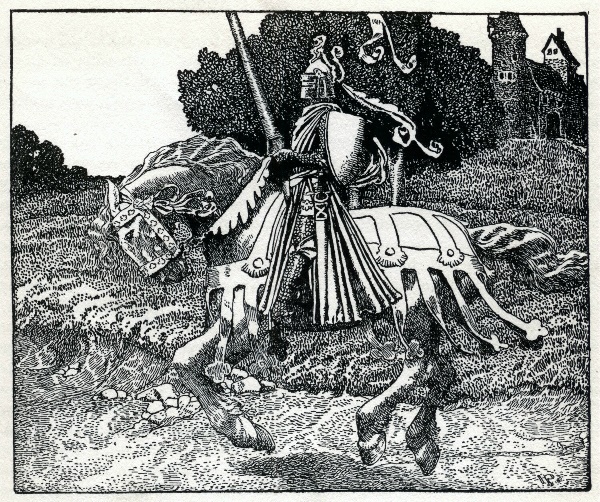Analog (formerly Astounding) has tended to be the weak sister of the Big Three science fiction digests. This can be attributed largely to Editor John Campbell's rather outdated and quirky preferences when it comes to story selection. There seem to be about five or six authors in Analog's stable, and they are not the most inspiring lot.
On the other hand, at least since last year, Analog has reliably produced a number of good serial novels that have elevated the overall quality of the magazine. This month's issue, the September 1960 Analog, contains the conclusion to Poul Anderson's The High Crusade, and it continues this winning streak.

Anderson is an author with whom I've had a rather stormy relationship… a one-sided one, of course. I was captivated by his early novel, Brain Wave, and generally disappointed by most of his output since. And then, about a year ago, he started writing good stuff again. His latest novel is excellent, far better than it has any right to be.
The set-up is ridiculous, and smacks of Cambellian Earth-First-ism: a crew of alien invaders visit 14th Century England, bent on adding Earth to the sprawling galactic imperium of the Wersgorix, only to be defeated by the retainers of the canny Baron, Sir Roger de Tourneville. Sir Roger, realizing that the repelled spacers represented only a scouting contingent, seizes their vessel and takes his entire barony on a trip to the nearby Wersgorix colony, Tharixan. His goal is to take the fight to the enemy before more come to Earth. Thus ends Part 1.
The fight for Tharixan comprises the whole of Part 2. Using a combination of medieval and captured weaponry, and aided by the aliens being somewhat out of fighting trim, their empire having lacked serious conflicts with which to blood their soldiers (while the feudal warriors of Europe spend most of their time fighting or planning for war), Sir Roger's forces are triumphant.
Nevertheless, a single world would hardly stand a chance against the fleets and armies of the aliens. Thus, Sir Roger unites the subjugated races of the empire together in a Crusade against the Wersgorix (Part 3). The success of this venture, and the individual machinations of his strong-willed wife, Catherine, and his wily subordinate, Sir Owain, I shall leave for the reader to enjoy.
And enjoy you will! Anderson clearly knows his medieval history and, more importantly, he adopts an authentic archaic writing tone which is, at once, evocative and yet perfectly readable. Using the clever artifice of telling the story through a chronicler, Brother Parvis, Anderson captures nicely the attitudes of medieval persons thrust into a futuristic universe. One technique I particularly admired (and, again, which I think could easily have been botched), is the narrator's recounting of scenes that he, personally, could not have witnessed, but rather reconstructed after the fact. It is a clever way of transitioning from 1st to 3rd person without jarring the reader.
Anderson's biggest coup, though, is that he can make such a silly story at once plausible and seriously executed. Strongly recommended — 4.5 stars out of 5.

(and for those following along as the Journey zips across Japan, I am now on the train from Nagoya to Osaka, this country's third and second cities, respectively. Osaka is one of my favorite cities, and I look forward to relaxing pool-side and typing my next article on the rest of the September 1960 issue. Stay tuned!


Someone as prolific as Anderson is going to produce a lot of forgettable stuff, although he usually at least reaches the level of decently written adventure yarns. In the last few years he seems to have grown a bit, and once in a while he produces an excellent story like "Call Me Joe" or "The Man Who Came Early" or "Journeys End." "The High Crusade" was obviously a labor of love for him, and the reader shares his joy in telling the story.
I'm glad you enjoyed!
Somehow, none of those three titles sound familiar. I either missed them or they rolled off my brain.
They were a while ago:
"Call Me Joe" – Astounding April 1957
"The Man Who Came Early" — F&SF June 1956
"Journeys End" — F&SF February 1957
Sure Anderson cheats a bit here, setting the technically advanced aliens for an easy fall, because they expect every battle to just drop into their laps. But it's a fun romp and he clearly knows the period well. He even managed to pull off the archaic language. So few authors can do that. You usually wind up with the literary equivalent of "Yondah lies the castle of my faddah."
But what really works for me here is the underlying idea that primitive is not the same as stupid. Campbell probably didn't quite get it and assumed the heroes won because they're northern Europeans, but it could just as easily have worked with Saladin's Arabs or Genghis Khan's Mongols.
Right, and in fact, he likens the Imperium to the Romans, and the topplers of that empire were not just Germanic tribes, but also the Oriental Huns…
> primitive is not the same as stupid
The US Cavalry never quite mastered that lesson, unfortunately.
The Italians took a while, too.